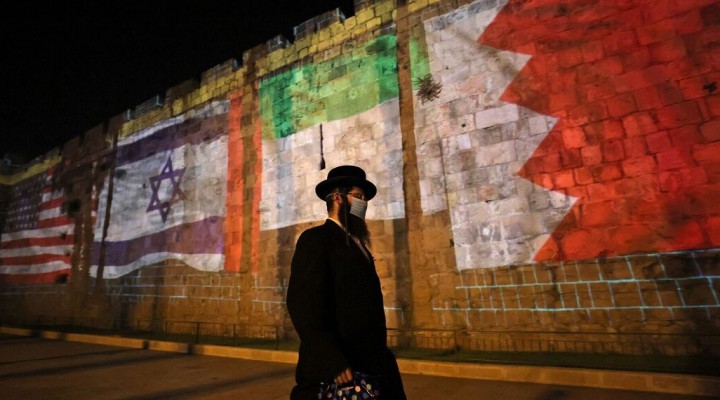Normalization Choirs: Insubstantial Efforts to Daunt Regional Nations Using ‘Iranian Threat/Occupation’ as Pretext

The Zionist-American axis has failed in diagnosing the letdowns inflicted upon it on more than one front, from Syria to Lebanon, Yemen, Iraq, and Palestine, despite normalization attempts, after the fierce resistance shown by the peoples of the region and their legendary and indescribable steadfastness in the face of its divisive and hegemonic schemes. Therefore, it has nothing but to fabricate false allegations against the Islamic Republic of Iran.
Analysts have repeatedly stated that this offensive axis aims to strengthen its proxies through security, economic, and military cooperation in order to protect them from any intensification of an alleged ‘Iranian threat,’ especially in case the nuclear agreement is signed and the increasing influence it may provide for Tehran.
As for the most dangerous and heinous goal, it is to obliterate the Palestinian righteous cause by promoting the temporary Zionist entity as a normal and friendly ‘state’ for Arabs and Muslims.
That is why the United States, the sponsor of this demonic axis, is ready to provide political support, but of course within the ceilings it sets as it is distancing itself currently from any reckless move towards Iran as it has issues that it considers more important, such as China and Russia.
Besides, if the US has withdrawn some of its soldiers from the region, this does not mean that it will constrict its vital sphere of influence, neither its ambitions, nor its expansionist schemes.
With regard to the Zionists, those occupiers realize more than ever that their temporary entity is inconsistent since their defeat in Lebanon, in 2000 and 2006, when the prestige of their so-called ‘indomitable army’ was shaken, and especially as they currently face worsening crises.
As for the Persian Gulf states, Saudi Arabia, the UAE, and Bahrain have been seeking to consolidate bilateral ties with the occupation since the Trump era and ‘The Bahrain Conference’, which was held in June 2019, under the auspices of Jared Kushner.
It is true that Riyadh has not normalized publicly, but it is far and wide known that MBS supports this approach, as well as every anti-Iran policy and discourse.
Certainly, the goal of the Gulf regimes is to shield their thrones in case Washington quits the region. More than once, Abu Dhabi and Riyadh have shown an unprecedented willingness to employ their solvency and do whatever is necessary to protect their illegitimate rule from an imagined or artificial threat that comes from Iran. They have also frequently asked Washington for assurances and guarantees in this regard.
Egypt, for instance, will not go far with this axis’ hysterical hostility against Iran because Cairo seeks only to attract investments and strengthen economic ties, chiefly with wealthy countries like the UAE.
Besides, it does not seem that Morocco’s stance is far from this same goal, as the Moroccan economy has recently endured high public debt and the spread of unemployment, which accordingly needs structural treatments.
On the other hand, the region is witnessing an intensification of the axis of resistance’s might, which therefore upsurges an existential threat to the occupation entity.
Therefore, the normalization agreements, the deal of the century that preceded it, the Negev summit that followed, and other coordination meetings undoubtedly aim at dispelling the settlers’ existential concerns.
We remember well how the Zionist settlers lived during the ‘Sword of al-Quds’ operation last year. As for the brave Palestinian resistance’s operations during the past months, they have demonstrated the abject failure of the occupation’s Shin Bet, its police, and its various offensive agencies.
For its part, Tehran has established in the last decade a joint resistance axis which is geographically dispersed but strategically united. In turn, Tehran meticulously monitors the enemy and plans for the appropriate place and time for confrontation. The targeting of a strategic intelligence centre in Erbil last March, with 12 missiles, has been a clear indication that red lines have been drawn in this regard.
Moreover, the various resistance forces have proven that they are not only affiliated with Tehran, but rather part and parcel of its anti-imperialist agenda, and uphold national and religious values, each in their own country, all united by the Palestinian cause.
In contrast, the US hostile sanctions have prompted these resistance movements to adhere more to their ethical and religious obligation of eliminating this imperialist idol, after its success in building a cumulative strategy of liberation, while the strategy of the Zio-American axis is based on political and financial interests that are constantly changing.
The latest example is that the coalition of aggression against Yemen, launched in 2015 with more than 20 countries, has ended up with only Saudi Arabia and the UAE, which are calling for more support due to the staunch Yemeni resistance.
All of these challenges cannot be addressed by any normalization tie, even militarily, because the strategic dispersion of these flimsy states cannot be united by such a shattered occupation, and therefore it is fragile in the face of Iran and the resistance axis, aka al-Quds Axis.
 TheAltWorld
TheAltWorld 
0 thoughts on “Normalization Choirs: Insubstantial Efforts to Daunt Regional Nations Using ‘Iranian Threat/Occupation’ as Pretext”